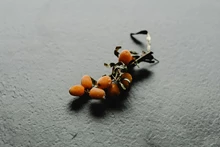
Phosphorus is a naturally occurring mineral that is required for plant growth and development, and the Earth's agricultural-grade phosphorus stocks are predicted to be depleted within the next 50 to 100 years. The findings were published in Current Biology.
"We can't manufacture additional phosphorus after the world's supply is depleted," said Hatem Rouached, an assistant professor in MSU's College of Agriculture and Natural Resources and a member of the Plant Resilience Institute. "Ideally, we'd like to be able to grow plants with less phosphorus in the soil."
Phosphorus is absorbed by plants from the soil. When soil lacks phosphorus, plants take up more iron from the soil, which becomes hazardous at higher amounts. Earlier research suggested that iron poisoning caused the roots of plants to stop growing. For the first time, researchers at MSU and the Carnegie Institute for Science have discovered evidence that plant roots stop growing prematurely in the absence of iron. This alters the way researchers approach the problem.
"How come the root stops developing before iron accumulates in the roots if iron poisoning is the cause?" Seung Yon stated "Sue" Rhee, upcoming director of MSU's Plant Resilience Institute and MSU Research Foundation Professor, is now at the Carnegie Institution for Science. "We knew there had to be something else going on."
Rouached, Rhee, and their colleagues discovered an unique gene called Arabidopsis root-specific kinase 1 that regulates the target of rapamycin, or TOR, complex, which is the fundamental developmental regulator in plants, fungi, and animals. When a plant is deprived of phosphorus, the gene downregulates the TOR complex, signalling the plant's root to cease developing.
"This is the first time that a phosphorus deficiency signal has been linked to a TOR kinase in vascular plants," Rhee added. The researchers have filed a patent for this procedure and intend to investigate further uses for this gene. "We feel this is a game changer in plant mineral feeding," Rouached added. "We hope to create plants whose roots will continue to grow even when phosphorus is scarce."











